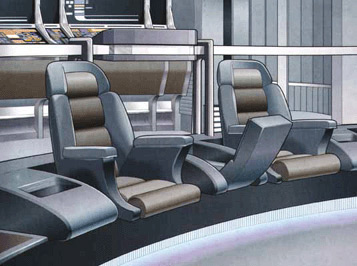Intrepid class/Command station: Difference between revisions
m (Used the wrong top nav.) |
(Updating with content adapted from Star Trek: The Magazine, as well as gallery images.) |
||
| Line 3: | Line 3: | ||
<div style="margin:15px; 0px;">[[Image:Intrepid_bridge_com.jpg|center]]</div> | <div style="margin:15px; 0px;">[[Image:Intrepid_bridge_com.jpg|center]]</div> | ||
The [[Intrepid class]] [[Intrepid class/Bridge|bridge]] '''command station''' provides seating and information displays for the ship's commanding officer (captain) and first officer. The command stations are centrally located, designed to maximize interaction with all key bridge personnel, while permitting an unobstructed view of the main screen. | The [[Intrepid class]] [[Intrepid class/Bridge|bridge]] '''command station''' provides seating and information displays for the ship's commanding officer (captain) and first officer. The command stations are centrally located, designed to maximize interaction with all key bridge personnel, while permitting an unobstructed view of the main screen. | ||
The chairs are identical, but the commanding officer traditionally sits in the starboard-side chair, while the first officer sits in the port-side chair. Bench seats on either side of the command chairs can act as temporary, if not entirely comfortable, seating for guest or mission specific personnel. | |||
Nestled between the captain's chair and the first officer's chair is a hideaway console. Most often, this panel is used to access sensor information, but can also be used to view sensitive information or take a private message without leaving the bridge. The panel has access to LCARS, and therefore the entire database of the ship. In emergency situations it can also be used in conjunction with command code access to control simple conn or operations functions. | |||
Regular ship operating procedures require a shift commanding officer to be on duty at all times, although the presence of other command personnel is optional, depending on specific mission requirements. [[Operating Modes and Procedures|Yellow and red alert]] operating rules generally require the presence of at least two command personnel, in addition to conn, ops, and tactical officers. | |||
<gallery> | |||
File:Intrepid bridge - command seats1.jpg|The command seating on ''USS Voyager''. | |||
</gallery> | |||
{{Utopia Planitia footer}} | {{Utopia Planitia footer}} | ||
Latest revision as of 22:08, 26 September 2015
| Utopia Planitia Fleet Yards |
|---|
INTREPID CLASS The Intrepid class bridge command station provides seating and information displays for the ship's commanding officer (captain) and first officer. The command stations are centrally located, designed to maximize interaction with all key bridge personnel, while permitting an unobstructed view of the main screen. The chairs are identical, but the commanding officer traditionally sits in the starboard-side chair, while the first officer sits in the port-side chair. Bench seats on either side of the command chairs can act as temporary, if not entirely comfortable, seating for guest or mission specific personnel. Nestled between the captain's chair and the first officer's chair is a hideaway console. Most often, this panel is used to access sensor information, but can also be used to view sensitive information or take a private message without leaving the bridge. The panel has access to LCARS, and therefore the entire database of the ship. In emergency situations it can also be used in conjunction with command code access to control simple conn or operations functions. Regular ship operating procedures require a shift commanding officer to be on duty at all times, although the presence of other command personnel is optional, depending on specific mission requirements. Yellow and red alert operating rules generally require the presence of at least two command personnel, in addition to conn, ops, and tactical officers. |
- Black-and-white ship illustrations by Tim Davies unless otherwise noted. Used with permission. All other images are copyright to their respective owners.
- Black-and-white ship illustrations by Tim Davies unless otherwise noted. Used with permission. All other images are copyright to their respective owners.
| REV SD 239209.26 |
|---|



